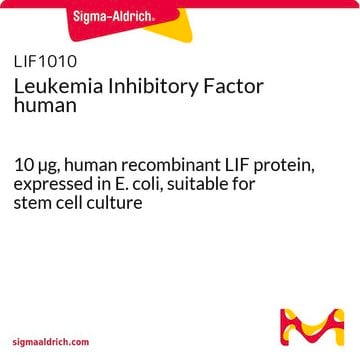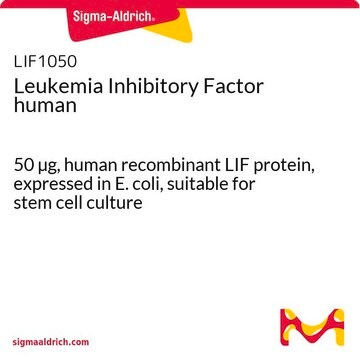SRP9001
Leukemia Inhibitory Factor human
≥95% (SDS-PAGE), recombinant, expressed in HEK 293 cells, liquid, suitable for cell culture
Synonym(s):
Differentiation-stimulating factor, Emfilermin, LIF, Melanoma-derived LPL inhibitor
About This Item
Recommended Products
product name
Leukemia Inhibitory Factor, human, recombinant, expressed in HEK 293 cells
biological source
human
Quality Level
recombinant
expressed in HEK 293 cells
Assay
≥95% (SDS-PAGE)
form
liquid
potency
≤0.5 ng/mL M1 cells proliferation inhibition EC50
mol wt
20 kDa
packaging
pkg of 10 μg
technique(s)
cell culture | mammalian: suitable
impurities
≤1 EU/μg protein Endotoxin level
UniProt accession no.
storage temp.
−20°C
Gene Information
human ... LIF(3976)
General description
Application
Biochem/physiol Actions
Physical form
Preparation Note
Storage Class Code
12 - Non Combustible Liquids
WGK
WGK 1
Flash Point(F)
Not applicable
Flash Point(C)
Not applicable
Certificates of Analysis (COA)
Search for Certificates of Analysis (COA) by entering the products Lot/Batch Number. Lot and Batch Numbers can be found on a product’s label following the words ‘Lot’ or ‘Batch’.
Already Own This Product?
Find documentation for the products that you have recently purchased in the Document Library.
Customers Also Viewed
Articles
Read article on hematopoietic cytokines and hematopoiesis
Our team of scientists has experience in all areas of research including Life Science, Material Science, Chemical Synthesis, Chromatography, Analytical and many others.
Contact Technical Service








